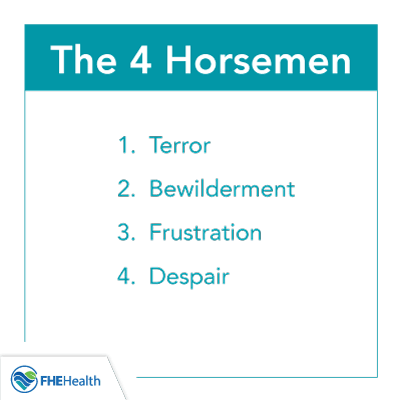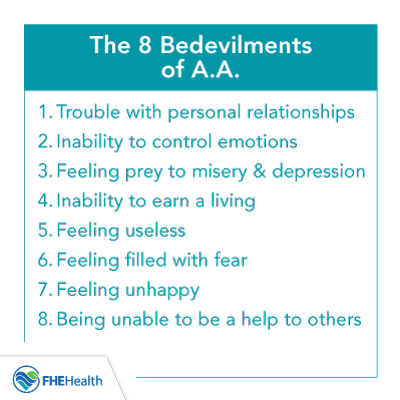
Once, drinking was a pleasure. Many people in recovery from alcoholism recall the early days of their drinking when after one or two drinks, they felt merrier, less stressed, and like a weight was lifted from their shoulders. They often had good times when they were drinking with family or friends. They felt that joyful release from worry. Their troubles seemed less. They no longer felt bored. Was it a trap?
For individuals suffering from alcoholism, the pleasurable aspects of drinking disappeared as their drinking became heavier, as their need to consume alcohol became greater. In Alcoholics Anonymous, aka the Big Book, the literature describes how drinking intensifies and as it does, the former pleasures associated with alcohol use dissipate while the negative aspects of alcohol use only worsen.
Many alcoholics can relate to what AA’s chapter “A Vision for You” describes. As drinkers try to control their alcohol use, they “fall short every time.” That’s a key sign of alcoholism–the inability to control the amount of alcohol consumed. There’s no longer such a thing as stopping after one drink. The effects of drinking spill over into relationships. The alcoholic has a sense that others no longer feel pleasure drinking with them–or being near them when alcohol is involved. As a consequence, the alcoholic feels increasingly alone and isolated, which often contributes to the desire to drink more in an attempt to drown out those negative feelings.
Understanding AA’s 4 Horsemen and 8 Bedevilments can provide insight into what it’s like to experience the intense darkness that alcoholism brings to someone’s life. Examining these aspects of alcoholism is an important part of the recovery process.
What Are the 4 Horsemen in AA?
 AA describes its 4 Horsemen as “terror, bewilderment, frustration, and despair.” These horsemen, of course, are a metaphor for what alcoholics often experience as their alcohol addiction deepens and they find it increasingly more difficult to manage. In reality, these so-called horsemen may affect a person’s life in ways like this:
AA describes its 4 Horsemen as “terror, bewilderment, frustration, and despair.” These horsemen, of course, are a metaphor for what alcoholics often experience as their alcohol addiction deepens and they find it increasingly more difficult to manage. In reality, these so-called horsemen may affect a person’s life in ways like this:
Terror
How often have you felt terror the day after an alcohol binge, wondering how you could act as you did. You might have scared yourself by driving while drinking or blacked out so that you don’t remember what you said or did when drinking. These instances can lead to a profound sense of terror at what’s happening as a result of drinking. And yet, the terror alone isn’t a cure for alcoholism. In spite of the terror, the individual continues to drink, which can also feel terrifying as no amount of fear seems to enable them to stop drinking.
Bewilderment
Why is this happening? Other people drink. They don’t seem to struggle. A person struggling with alcoholism can experience confusion about why they are suffering or why they can’t control their drinking. It’s baffling to them how once they could enjoy drinking and how it all led to their present predicament.
Frustration
An alcoholic may feel habitually frustrated because their attempts to control their drinking or stop drinking fall short. Furthermore, important aspects of their lives like relationships and work may be suffering too, which only fuels their frustration.
Despair
Suffering with alcoholism can also lead to a sense of hopelessness. Failed attempt after failed attempt to stop drinking can cause a person to feel immense sadness. Broken relationships or the loss of a job can add to the despair that seems to grow as alcohol abuse continues.
What Are the 8 Bedevilments in AA?
 In the Big Book, AA’s authors describe the bedevilments that tend to plague alcoholics. These bedevilments are:
In the Big Book, AA’s authors describe the bedevilments that tend to plague alcoholics. These bedevilments are:
- Trouble with personal relationships
- Inability to control emotions
- Falling prey to misery and depression
- Inability to earn a living
- Feeling useless
- Feeling filled with fear
- Feeling unhappy
- Being unable to be a help to others
Do these bedevilments seem familiar to you? You may experience several of these or have your own to add to the list. Alcohol addiction causes suffering in various forms. As it leads to the deterioration of mental and physical health, it also erodes relationships, job performance, and finances. In some cases, it causes legal problems as in the case of drinking and driving. While these bedevilments may seem inescapable, they can be managed with sobriety.
Sobriety isn’t a cure for depression. It also isn’t a promise that a person won’t experience relationship problems or feelings of fear, but it does allow a person greater ability to manage their emotions and other important aspects of their lives. Under the spell of alcoholism, there’s no chance to cope with these or other “bedevilments” and the stresses of life that everyone faces. When a person stops drinking, the horsemen visit less frequently and the bedevilments no longer feel so overwhelming.
Understanding Bedevilments for Alcohol Addiction Recovery
Identifying the bedevilments in your life and understanding them is, in fact, a step on the recovery journey. For many, understanding the bedevilments of alcoholism provides the springboard to seeking help whether from Alcoholics Anonymous meetings or enrollment at an alcohol rehab center like FBE Health.
Unfortunately, many people experience these problems but aren’t ready to ascribe them to their drinking. They might blame their relationship problems on something else. They have experienced depression long before they became a drinker. They may have found it difficult to earn a living before becoming an alcoholic. Just as it’s important to recognize these bedevilments, it’s important to recognize denial.
Yes, a person may experience relationship problems even if they’re not an alcoholic. They may struggle to find a good job. They may fall prey to sadness. But alcohol always makes these things worse–never better. Coming to terms with one’s bedevilments and habit of denying alcohol’s impacts on their lives is a key to recovery. Alcohol intensifies the misery of bedevilments and makes it nearly impossible to stop them from occurring.
How to Send the Horsemen Galloping Away
AA offers one method of achieving recovery from alcohol addiction. It’s based on the 12 steps and involves attendance at support group meetings. Many people choose to attend as a form of aftercare after they complete medical detox and formal alcohol rehab treatment programs that include clinically driven treatment. AA works for some but not everyone. That’s normal. There are various treatment paths to recovery. The idea is to find the one that works for you.
What about desire? It takes desire to recover. The truth is, some people don’t want to stop drinking. Maybe the bedevilments haven’t intensified for them the way they have for you. Maybe the horsemen haven’t impacted their lives as they have yours. What’s important is your desire to recover. That desire is what prompts you to seek help. When you choose to enroll in treatment for the help you need to stop drinking for good and manage your urges to use alcohol, you also choose not to allow horsemen and bedevilments to ruin your future.
Contact FHE Health to discuss our enrollment process and alcohol addiction treatment plans. If you have the desire to stop, we can provide you with the tools needed to put alcohol behind you. Recovery takes time, but you won’t be alone. Let us help you manage your addiction and achieve your recovery goals.






